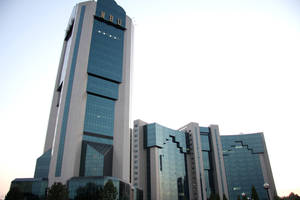Uzbekistan has attracted significant credit resources from Russia in recent years. Mainly from the banks that are now under the sanctions list - Gazprombank, VTB, VEB and others. Given that these banks are supposed to finance major economic projects in the country, there are risks that Uzbekistan could lose this funding due to sanctions.
The Central Bank reported that the loans taken from Russian banks, which are under severe sanctions, make a tiny fraction of the total of local banks' liabilities.
Reportedly, the banks have attracted international legal consulting companies in order to pay off their obligations to Russian sanctioned banks in a timely manner and without creating the risk of secondary sanctions.
“Measures were taken to carry out each transaction based on conclusions of law firms. This, in turn, creates the possibility of uninterrupted attraction of resources from international financial markets for the continuous financing of large economic projects in the future.
Russian funding
Gazprombank in 2021, the bank entered into several loan agreements with Uzbek companies. For example, the bank intended to provide $750 million to the owner of the Samarkand chemical plant for two projects, as well as $300 million to Uztransgaz. In addition, Gazprombank joined the consortium that will allocate $800 million to Sanoat Energetika Guruhi (formerly Jizzakh Petroleum) for the construction of a new gas chemical complex in the Bukhara province. Prior to this, the bank allocated a loan of $120 million for the implementation of the project at the Shurtan gas chemical complex, and also planned to take part in financing the modernization of the Samarkand airport.
VTB planned to allocate $1 billion to finance the investment program of the Navoi Mining and Metallurgical Combine;
The Russian state corporation VEB.RF planned to allocate 174 million euros in 2019-2022 to support the supply of Russian high-tech products to Uzbekistan. VEB.RF also opened a $650 million credit line to Uzbekneftegaz. The corporation also provided a loan of 712 million euros without state guarantees and guarantees for the construction of a copper processing plant as part of the AMMC.
As reported earlier, banks in Uzbekistan recommend their clients to transfer international settlements with foreign partners from Russian banks that have fallen under sanctions to others in order to prevent unwanted blocking of funds.
For the Russian invasion to Ukraine, Western countries imposed sanctions on Russian banks.
Banks from the SDN list (“black list”) are cut off from all international ties, since, according to the US CAATSA law (“Counteracting America’s Adversaries Through Sanctions”), any bank in the world that will enter into a major deal with a bank from the SDN list, will itself will fall under secondary sanctions.
This risk is theoretical, so far there have been no such precedents. However, the US has already announced that it will tighten up tracking assistance to Russian sanctioned entities around the world, which makes the threat of secondary sanctions more serious.












